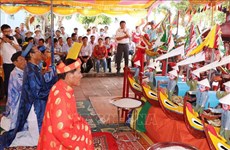Buddhist followers join hands in ensuring social welfare
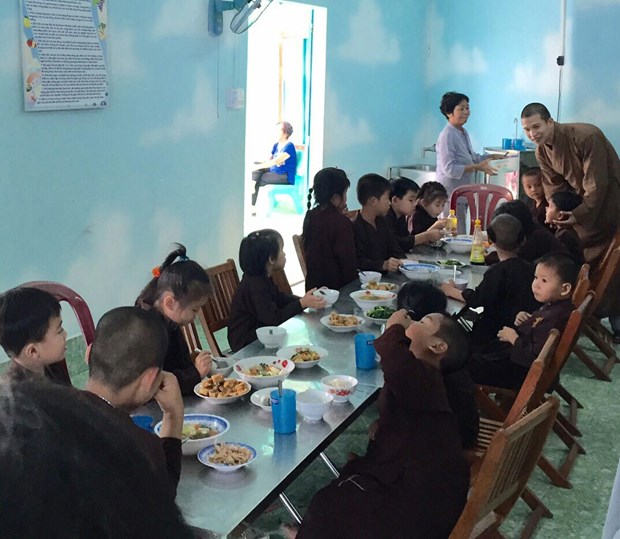 Ven. Thich Phuoc Ngoc and children at Suoi Nguon Tinh Thuong Orphanage Centre in Vinh Long province (Source: courtesy of Ven. Thich Phuoc Ngoc)
Ven. Thich Phuoc Ngoc and children at Suoi Nguon Tinh Thuong Orphanage Centre in Vinh Long province (Source: courtesy of Ven. Thich Phuoc Ngoc)Hanoi (VNA) - Hundreds of orphan and homeless children call Venerable Thich Phuoc Ngoc ‘father’ and Suoi Nguon Tinh Thuong (spring of compassion) Buddhist Orphanage Centre ‘home’, where they are loved, cared for and provided with nutrition by monks and volunteers.
The Suoi Nguon Tinh Thuong Buddhist Orphanage Centre in Tam Binh district in the Mekong Delta province of Vinh Long is among hundreds of Buddhist establishments which have been protecting and assisting disadvantaged people, particularly children, across the nation.
Director of the centre, Venerable Thich Phuoc Ngoc, 36, who is also Head of Phuoc Quang Pagoda, told a Vietnam News Agency (VNA) correspondent that he founded the centre in 2012 after returning home from overseas religious studies, hoping to give a roof to disadvantaged children.
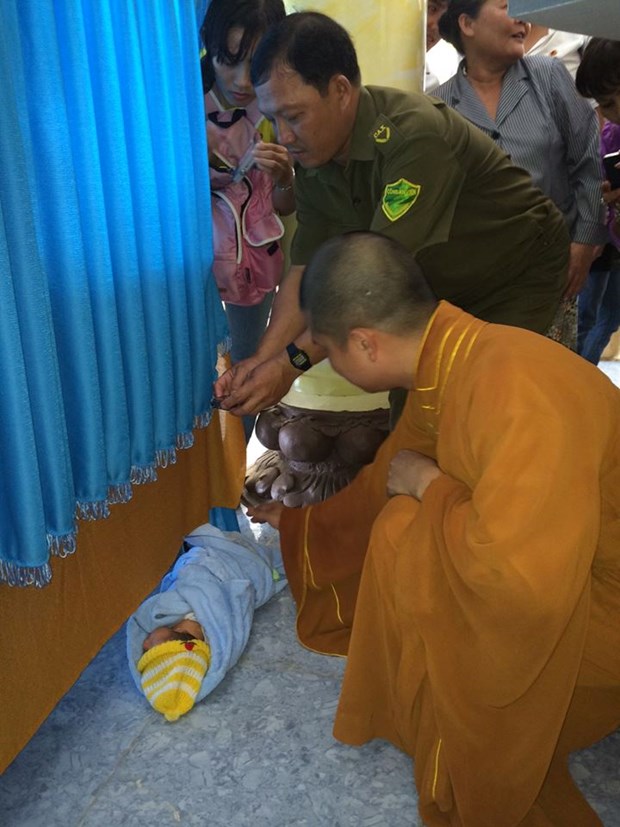 Ven Thich Phuoc Ngoc and a local law enforcement official find a days-old baby left at the gate of his pagoda (Source: courtesy of Ven. Thich Phuoc Ngoc)
Ven Thich Phuoc Ngoc and a local law enforcement official find a days-old baby left at the gate of his pagoda (Source: courtesy of Ven. Thich Phuoc Ngoc)Venerable Thich Phuoc Ngoc has received numerous insignias for his contributions to the nation’s charity and social work, including a third-class Labour Order granted by President Tran Dai Quang in September, a Certificate of Merit by Prime Minister Nguyen Xuan Phuc in 2015, and many others by ministers, and local authorities.
In the spirit of Buddhism, Buddhist followers are supposed to help ease sufferings of sentient beings. With recognition from leaders of the State, Government and sectors and citizens, Venerable Thich Phuoc Ngoc said he and his partners have been encouraged to do more and inspired to take greater responsibility in society.
Compassion reaches every corner
Everyone feels sorry at the sight of an old monk caring for hundreds of disabled children at Ky Quang 2 Pagoda in Ho Chi Minh City’s Go Vap district. Over the past two decades, Venerable Thich Thien Chieu, head of the pagoda, has played the role of both “mother” and “father” of more than 200 ill children, providing them with meals, medicine, education and play time.
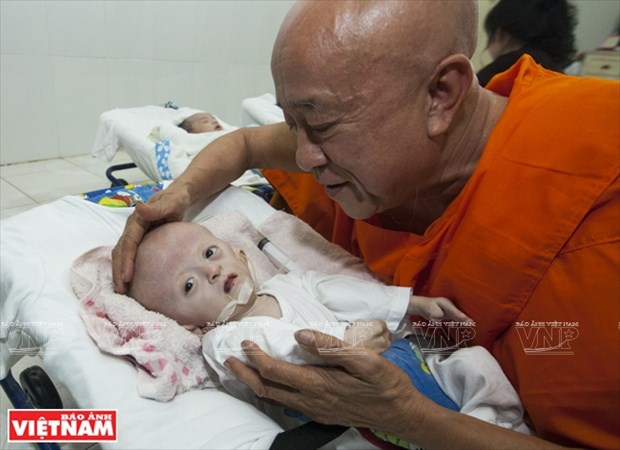 Ven Thich Thien Chieu and an ill baby at the pagoda (Source: VNA)
Ven Thich Thien Chieu and an ill baby at the pagoda (Source: VNA)Only 60 among the children at the pagoda are healthy. The rest are sight-impaired, mentally ill, victims of Agent Orange/Dioxin or have HIV. However, they are blessed because they are loved and cared for, Venerable Thich Thien Chieu said, adding that monks, nuns, caregivers, volunteers at the pagoda, donators and locals, all are here for them. No one is left behind.
With support of the local educational office, many of them are enabled to go to school. Those who have disabilities and are unable to follow academic educational programmes are taught ethics and receive physical therapy at the pagoda every day.
The pagoda’s staff also seeks assistance from local vocational training institutions to provide short-term training courses, job placement and consultation services for those with visual impairment, helping them find jobs to support themselves and integrate into the community.
With experience he has learnt from his overseas religious trips and studies across over 30 nations around the world, Venerable Thich Thanh Huan has customised treatment methods while creating a healthy living environment at the pagoda to help his charges develop a good personality and lifestyle.
His Huong Sen (lotus perfume) club, the first pagoda-based HIV/AIDS treatment establishment received numerous international financial aid from the United Nations Children’s Fund (UNICEF), CARE, the Nordic Assistance to Vietnam (used to known as the Norwegian Church Aid).
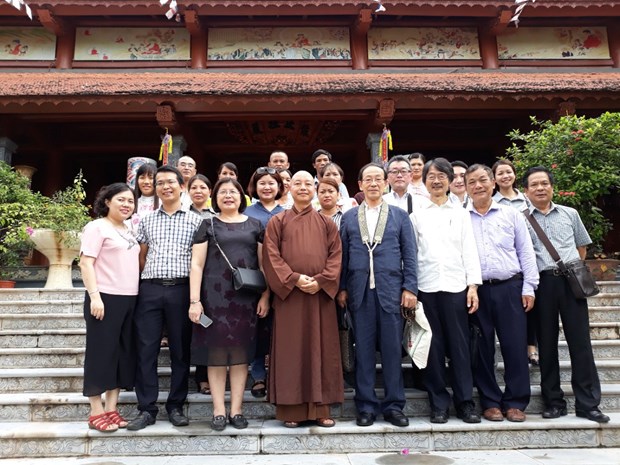 Ven. Thich Thanh Huan and a Japanese delegation visiting Phap Van pagoda to study its charity model (Source: VNA)
Ven. Thich Thanh Huan and a Japanese delegation visiting Phap Van pagoda to study its charity model (Source: VNA)Many local people used to disagree with the work because they think that such solemnly religious places like pagodas should not house social evil-doers. However, they were born with the same rights as any other persons. Making mistakes in their lives doesn’t make them evil, the monk said, explaining that those who stray need more help and are more welcomed than anyone else, Venerable Thich Thanh Huan said.
The Phap Van Pagoda was selected to pilot the pagoda-based HIV/AIDS treatment model, which has proven effective over the past 15 years. The model has been implemented in a number of pagodas, including Hai Duc pagoda in Thue Thien-Hue, Ky Quang 2 and Dieu Giac in Ho Chi Minh City, benefiting hundreds of patients.
Numerous communications campaigns have been conducted to help reduce public discrimination against people with HIV/AIDS, encouraging the patients to join consultation work. A number of clubs have been established under the auspices of the Phap Van Pagoda, providing treatment, medicine, consultancy, and financial assistance for HIV/AIDS patients and their families.
“Three trees make a huge mountain”
According to the Vietnam Buddhist Sangha Central Committee’s Department of Information and Communications, there are over 1,000 Buddhist charity classes, benefiting nearly 20,000 needy children; 64 establishments offering housing to more than 3,000 orphans and disadvantaged children; over 20 others accommodating over 1,000 homeless elderly, with half living in Hoang Phap Pagoda in Ho Chi Minh City’s Hoc Mon district.
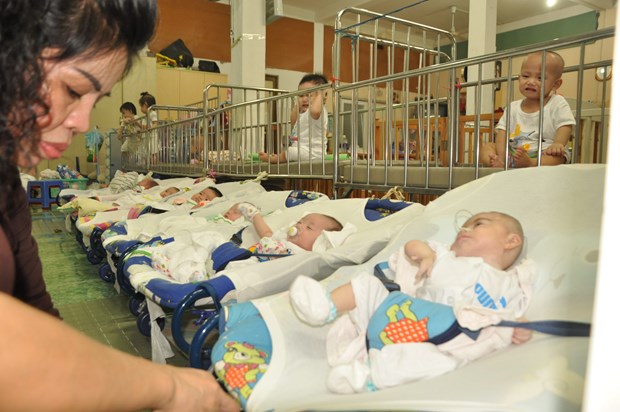 Parentless infants at Ky Quang 2 Pagoda (Source: VNA)
Parentless infants at Ky Quang 2 Pagoda (Source: VNA)In the 2012-2017 tenure, the VBS’ chapters at all levels mobilised nearly 6.84 trillion VND (301 million USD) for the nation’s social welfare. In 2016 alone, the VBS mobilised more than 1.33 trillion VND (58.6 million USD) in cash and materials for charity activities.
The figures speak not just to the value, but also the efforts that dignitaries, monks, nuns, and Buddhists have made for the well-being of Vietnam’s citizens.
In an interview with the VNA correspondent, Most Venerable Thich Thanh Nhieu, Vice Standing Chairman of the VBS Executive Council, highlighted the religion’s tradition of “protecting the nation, solacing its people”, saying that dignitaries, monks and nuns nowadays have joined hands with the Party, State, Government and other socio-political organisations, particularly the Vietnam Fatherland Front, to contribute to the nation’s social welfare, under the motto “Religion-Nation-Socialism”.
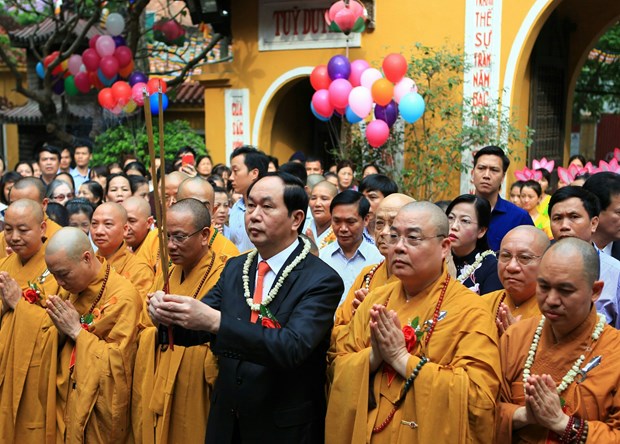 President Tran Dai Quang visits and burns incense at Quan Su pagoda. Most Ven Thich Thanh Nhieu stands on the left of the President. (Source: at courtesy of VBS)
President Tran Dai Quang visits and burns incense at Quan Su pagoda. Most Ven Thich Thanh Nhieu stands on the left of the President. (Source: at courtesy of VBS)Over the past years, the
VBS has encouraged more and more dignitaries, monks, nuns, Buddhist followers,
donators, and establishments at home and abroad to share the burden of social
issues, poverty reduction and hunger eradication, natural disasters,
environmental protection and to build new-style rural areas. Individuals and units
have been honoured by leaders of the Party, State, Government, and people for
their silent, yet outstanding contributions to the social and charity work.
Dr. Bui Huu Duoc, Director
of the Buddhist Affairs Department under the Government’s
Committee for Religious Affairs, said history featured great
contributions Vietnamese Buddhism has made to national construction, protection
and development. The religion has also addressed social issues by connecting
resources and efforts to help disadvantaged Vietnamese people. Pagodas across
the nation host and organise short-term courses, where monks and nuns, via
their teachings and talks guide people, particularly youths, to live a healthy
lifestyle and do good deeds.
The State and Government
have facilitated practices of all religions, including Buddhism, encouraged
their charity and social work and recongised their contributions. This has been
clearly manifested in all relevant regulations and ordinances, particularly in the
Law on Belief
and Religion, the first of its kind, which was adopted by the National Assembly
on June 18, 2017 and is to take effect from 2018, he said.
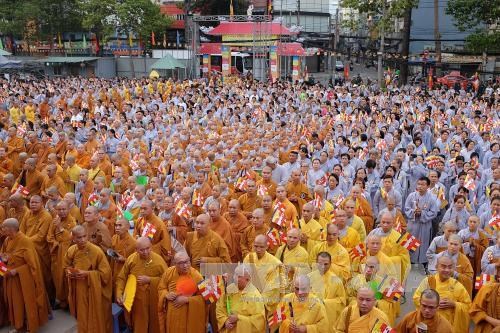 Crowds of dignitaries, monks, nuns, and Buddhist followers at a 2016 Vesak ceremony (Source: VNA)
Crowds of dignitaries, monks, nuns, and Buddhist followers at a 2016 Vesak ceremony (Source: VNA)The Buddhism philosophy is to help people attain happiness, which is close to the ideals of the Communist Party of Vietnam (CPV). The political report of the CPV Central Committee, 11th tenure, stated that one of the key tasks is to ensure social welfare, and care for people’s spiritual and material lives, particularly the poor and those living in remote and mountainous areas, and in difficult economic circumstances.
The similarities between the Buddhism philosophy and the CPV’s ideals lay a solid foundation for Buddhism to thrive along with the nation, Duoc said.-VNA











